Thursday Feb 19, 2026
Thursday Feb 19, 2026
Friday, 7 January 2022 01:42 - - {{hitsCtrl.values.hits}}
By Jibraan Mohamed
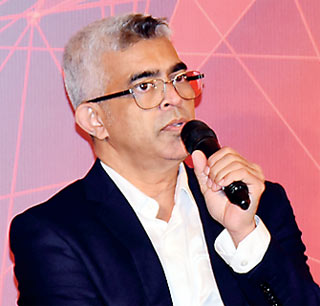 |
| SPC Chairman Dr. Prasanna Gunasena |
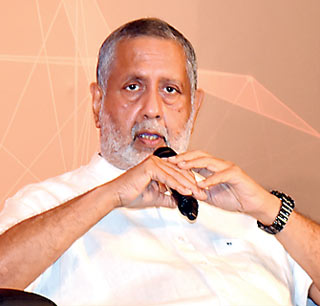 |
| Engenuity AI Chairman Rajendra Theagarajah |
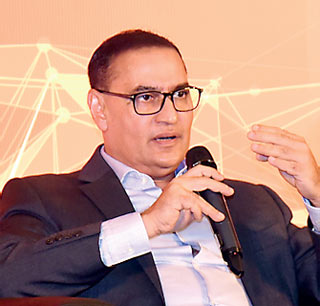 |
| SLIIT MD/CEO Prof. Lalith Gamage |
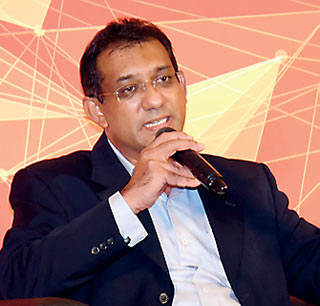 |
| LOLC Finance MD/CEO Conrad Dias |
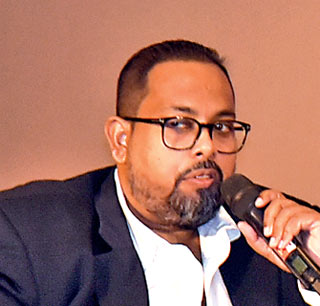 |
| Moderator Engenuity Ai CEO Gihan Mendis |
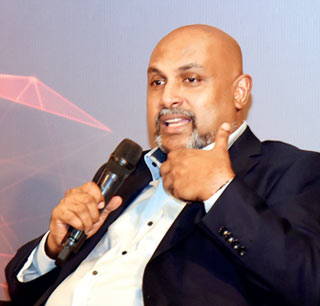 |
| A Global Thought Leader on Artificial Intelligence Nadun Muthukumarana
|
Artificial Intelligence (AI) algorithms were modelled 50 years ago by mathematicians, but throughout the ages computational power was not sufficient to take its leap, until recently the utilisation of cloud computing made it possible.
Digitalisation is an emergence from IT to the new norm like video conferencing and online purchases and transactions to name just two simple examples, but it had been clawing its way until COVID-19 struck. After the pandemic it could no longer be sluggish as it was clasped in faster, for individuals and businesses had to either be in favour of adoption or be forsaken.
Engenuity Ai, an AI and Data Science venture, hosted a fireside chat recently themed ‘The Divergent’ with a vibrant panel of experienced practitioners of different industries and attended by major business stakeholders from all industry verticals in Colombo.
The panellists were A Global Thought Leader and an expert in AI – Nadun Muthukumarana, LOLC Finance MD/CEO Conrad Dias, Sri Lanka Institute of Information Technology (SLIIT) President/CEO Prof. Lalith Gamage, State Pharmaceutical Corporation (SPC) Chairman Dr. Prasanna Gunasena and Engenuity AI Chairman Rajendra Theagarajah.
The entire session was moderated by Engenuity Ai Co-Founder/CEO Gihan Mendis.
He set the stage by speaking of the evolution the pandemic has made in giving rise to bold new decisions and also speaking of investments companies have poured into AI, Data Science, and lots of other technologies but with no proper guidance in steering through.
With the account of it the event provided the audiences a high-yielding session of how Sri Lankan individuals, companies both private and public can at this present decisive moment undergo a massive transformation by hurdling over to the bleeding edge of digitalisation.
Nadun Muthukumarana spoke on how he sees this divergence and why does Digital and AI matter. Explaining that the pandemic had changed the perspectives and lives very much from organisations to individuals in an unprecedented way and adoptions happened rapidly.
Even before it was best practice to be digital and agile as a business and be data driven primarily, yet with the pandemic if these were not adopted with these practices many organisations could not survive. So, this is the right time to diverge and digitalise at the core of a business leading to be innovative for the future.
He went on saying that prior to the pandemic there were major issues in the world like climate change which still needs to be fixed. “The global economics was already quite volatile and the dynamics were already quite changing all the time even before the pandemic, however the pandemic has completely disrupted all normal patterns of global economic, health, and transportation type of networks.”
Prof. Lalith Gamage spoke on how Sri Lanka can be on this journey with its present capabilities and with the future workforce to harness digital transformation. He stressed on having a fitting AI strategy to begin with.
For when IT started becoming a thing here back then 20 years ago and companies started using it as a service for their benefit, over the years with its development and adoption, it has provided a ripple effect of a proven strategy with an export market for Sri Lanka worth over $ 1.5 billion and the fourth largest export earner for the country with even a larger scope for it.
There were five areas where the strategy was put in place which brought about the IT revolution, and similarly it is projected that in the next 20 years it will be based on AI. This requires a strategy and Sri Lanka has not left to keep sight of it since the UK unveiled their 10 years AI strategy just two-and-a-half months ago, the Professor related.
He demonstrated that a strategy must be mapped out with the necessary fields included, in it the first and foremost is awareness about the technology and its competitive advantage all around. Then at how investments can be secured both privately and through the Government. Sectors to consider investments would be agriculture, healthcare, hospitality, education, banks and so on.
Thirdly capacity building, where professionals are required in developing new technologies and systems, then training the users whilst also training and educating policy makers. While the fourth one is adoption of AI, adoption should happen in a gradual process so organisations can get themselves transformed which could happen with educating and familiarising oneself with the rapidly changing field as a result it will be a gradual process.
There is after all governance and policy that would come when free thinking and innovation is done, for protecting data is crucial as data is the rocket fuel of the industry. This will be made possible with the Data Protection Act that will be enacted in Sri Lanka as he commented: “The data protection act is now completed and it is passed by the Cabinet, it has to be tabled at the Parliament and it’ll be tabled very early next year and with that we can ensure that data protection will be here, your data is protected.”
Conrad Dias spoke on his experience of how AI and Data Science has contributed to LOLC, where the corporation is into many business verticals. He mentioned of how generalised AI has become today and LOLC being able to seize the opportunity such as the simple process automation side where they have adopted Machine learning given Robotic Process Automation (RPA) leading with multiple benefits and others like predict scoring, where it is been tested and taken on not only here but in other parts of the world.
The LOLC’s payment platform has AI capabilities in it, for fraud detection in the transaction data driven economy. So, he recommends adopting data driven technologies as AI is one. So, then there are rule driven options embedded to their system like On-Predict Scoring, a decision engine adopted in the first phase and secondly have green channels with the data created.
“Even though a banking sector is totally a data driven organisation, sometimes we do not have all the data which is required, so therefore there were several stages of adoption, so that is what I can say from an organisation perspective and from a local and what we have done in using this technology. I think no organisation can ignore it in my view and as these are available to anyone to use it, and if we do not start using it, it’ll be a challenge for the existence of that organisation,” he remarked.
Nadun as a global practitioner added on how Sri Lanka can be on the correct path. He stated that it is not only about the preparedness of these technologies. Wherefore our country is not alone as the world over AI is a major area of skill set that is in demand.
Though there is much effort driven, Sri Lanka will not be the exception as there are not enough people with the right level of skills and experience to perform AI, Digital, and Data Science tasks. The solution could be to collaborate, as the motive behind this is it is not possible to find a highly skilled professional to build a massive AI digital team and start journeying through.
From his experience on what he has witnessed, he explained that rather than trying to build everything alone, to develop alliances and collaborate with other organisations with all these ecosystems in partnering, alliances, hubs of excellence where they go to an expert and gain the necessary skills.
He cleared that collaboration for the private sector should not be misunderstood with competitors but rather with supply chains, value chains, ecosystems, and with your existing partners where there is no competition with. For the public sector he put in a good word saying it is the best place for collaboration and pooling of capabilities in the cooperative model, so all organisations aid into the best interest of all, and he sees Sri Lanka well poised for this recommending to do things slightly differently.
“If you make a real effort to give the nation a real foundation on Digital and AI, the return on that investment can be very quick. Within 12-24 months you will start to see the returns coming in. And this industry, because I have worked in it for over 26 years, I will tell you we will be the number one revenue generation channel for either an organisation or for the country if we were to build it successfully,” said Muthukumarana.
Dr. Prasanna Gunasena shared his struggle with battling with COVID-19 in support of the citizens and steps taken to get a grip in the battle and where technology played a part in the turbulent times. He emphasised on the importance of data, as overcoming the pandemic was no win or lose scenario, but a life-or-death tragedy.
The State Pharmaceutical Corporation was given the task of the vaccination undertaking. With it the data had to be accurate as decisions made were critical as every country did not have sufficient data. So here in Sri Lanka how the battle was carried out was through the skill, dedication and looking at a pattern with guesswork. With AI coming into the scene with meta-analysis he was able to come to a decisive moment.
Dr. Gunasena said: “I think Artificial Intelligence is important to make that decision precise, and minimise the error. So that is what I thought and I read and then I spoke to my classmate Dinesh, as well as Gihan, and we started a small process where to predict when to give the medications and how are we going to prioritise and how are we going to predict the necessity which is going to arise in future months. So, we did a very successful project and once we completed the project, I knew that manually this system would not run.”
He highlighted that critical decision making should be supported by artificial intelligence and should not end with only discussion, but an action plan which is usually seen as slow. In this way it is needed to have an iron force to bring this to bear and make it become a reality.
Nadun who helped the UK Government during the pandemic added to the doctor’s points that the whole testing and the identification of the genome of the SARS COVID 19 vaccine was using digital, analytics, and AI technology. Because a long time ago a genome test took months where now it can be done in a matter of hours. He had experience of contributing to a system of changing how the whole doctor patient lifecycle worked with digitalisation of paperwork.
An AI engine was built with the outcome of it being that all the backlogs were clear and the waiting list went down in the particular area from six months down to a matter of days because the AI engine would read the referral letters, prioritise who needs urgent care and put them into the right part of the queue and tell the doctor whose time is really valuable and precious to spend the quality time in terms of treating the patient or consult the patient and actually do what they are supposed to do rather than reading a pile of paper so that is a very timely example with a huge impact of how AI when applied to health bought a change. He indicated that AI does not mean to get rid of people but to get them to do more valuable and quality work that they are supposed to do in the first place.
Rajendra Theagarajah on being a business leader and witnessing many transformations spoke on a field less discussed which is the importance of nature preservation amidst all these developments taking place. As he argues that the balance sheet is always looked from the rupees and cents perspective but not harnessing the value of nature. He said that Sri Lanka has eight times more water than land mass, opening for the country to do marine diversity and marine conservation.
He stated that fossil fuel base generation is a shift that is happening to natural and renewables however in a step-by-step process. But reforestation and transit emissions must be encountered as a few years earlier a university in Sri Lanka found out that 45% of the entire carbon emissions in this country is contributed by transit for, Sri Lanka is a participant of the Paris Accords.
He went on saying that for every metric ton of carbon emissions we save, there is an opportunity to monetise it and given that Sri Lanka is facing some severe economic challenges, there is no better time than today to harness this and use data, perform analysis, use intelligence and seeing how we could harness nature and monetise.
He as an example illustrated about logistics operators in the country which has an opportunity using data and route management across the country to see how better to manage their route to minimise congestion for the reduction of carbon footprint.
On the other hand, something less known to us is the pressure coming from export buyers (multinationals) subscribed to this Paris Accords where they too want to contribute to the reduction of carbon footprint. He gave an example of tyre and Michelin where they have global and set a target for 2030 in this mission. It is a pressure that is giving way to this.
“Now naturally, like Microsoft they will come back to their local partners in each country and say, in part of supply chains what are you doing if you want to be my supply chain partner as part of your growing of rubber or the way you process rubber and the way you manufacture the tires, how do you do something to reduce the footprint and I believe to engage you or if you are ready to partner with,” said Theagarajah.
Conrad listed ways of how AI and Data Science can enter our local market while looking at barriers from an implementers perspective and challenges from a leadership’s perspective. He indicated that the mind is the first one and then having the individuals and governance in place.
However, he mentioned for Sri Lanka, it is the mindset and the culture especially upon implementation as Nadun mentioned of people having the fear of losing their jobs. Whilst also education and communication too matter, he thinks it is adoption and the mindset of how to utilise AI to perform a job.
Leadership being the other barrier, he says however much effort is driven if this is not cultivated implementation will be an impediment, yet asserted technology is not a barrier. He too as Nadun explained said about partnerships and the scare of data being misused can be rectified with the Data Protection Act. He shared two contexts on a global scale which they have invested in.
One of it was investment in a digital platform abroad in a finance driven organisation which is completely AI driven giving 7,000 variables to determine the customer worthiness in terms of giving a loan within minutes and seconds, this is humanly impossible to predict such an analysis.
Another investment which they have made is in AI, IoT, and Digital in a manufacturing plant for a Sri Lankan start-up for the apparel sector completely transforming the apparel industry. He also spoke of PickMe using AI to determine the price, customer service, and others which uses data science.
The professor noted how economically and citizen wise there are especially benefits. So how can services in private and public be obtained at a citizen’s convenience such as opening a bank account, a sim card, and where physical presence is necessary for digital transformation.
From ICTA where the professor serves on a board capacity, they have embarked on a huge project which is Sri Lanka Unique Digital ID Framework and prototyped to certain sectors for now. This will be an e-Citizenship per say.
“Every citizen, every company, every entity will be given a unique digital ID. If you’re an individual all your 10 fingerprints, your IRIS, your face, with your other attributes are taken and you will be given a unique digital ID, you do not need to carry a piece of digital ID. And there are various authentication methods to verify your ID. It could be your number, it could be your signal phone connected to a 4G. So once that is established we have already developed a prototype,” said the industry strategist.
With this every citizen will be issued one within a period of two years as enrolment takes time. Above this there is something else that is being developed for national data and all service providers will be on this network. There will be a set of and conforming to the standards and protocols anyone can build applications and install on this platform so whatever, if you are a service provider your service can be obtained by any consumer. The citizen will be the ultimate beneficiary.
Nadun spoke here of certain building blocks to envision the digital e-Citizen and which is to develop any AI enabled services, public/citizen/customer trust is vital. As it is making the receiving individuals trust better, for in certain countries the COVID-19 app that was developed was never used by citizens even though that could have helped quite through the pandemic.
He explained that Digital AI, and Data is not an accountability only for the leadership to be provided by the IT organisation but a holistic thing by all in the organisation and led out by the boardroom.
A few approaches he mentioned for implementation is that no project should take any more than 12 weeks to be done, planned, and executed. Within that 12 weeks, every two weeks will be a sprint cycle and everything should be done using the agile methodology with an optimal team of 7-10 people.
Agile is the preferred methodology because in normal projects it is needed to invest 12 months to see the outcome, and if turned unsuccessful it will be a waste of effort. However agile even with a 12-week project, every two weeks it will be known whether the project is making progress or not.
He went on saying cloud first is crucial as some AI algorithms were written by mathematicians long ago but no proper compute power which is now not a challenge with scalable, easily accessible, available, and secure cloud platforms, AI can thrive. He recommends not using any AI project on on-premise data centre’s given the pace of processing. He finished here by mentioning the diversity of different kinds and types of people for better results.
The session ended with discussing how AI can solve Sri Lanka’s economic challenges. Conrad believes in utilising the talent in the country going from a simple IT/BPO industry by creating intellectual property with AI though we have a low population.
The professor suggested some long-term solutions like export products that can be exported, the technology diffusion should begin with start-up companies in many areas and should be developed so their exit should end in foreign companies, increasing the product basket size. He mentioned an example of a Sri Lankan logistics and apparel company called nCinga that exited for $ 15 million which he wishes to see many of such happening.
Theagarajah said there is inadequate revenue collection with a direct collation to wastage, if the Digital IT framework comes into play everyone will be tagged into taxation and be in the country’s revenue coffers. He talked about value addition like in agriculture to be checked with AI as for what to grow, when to grow, and how to grow, and finally the relatively untapped opportunity in Sri Lanka’s nature.
Gihan said it is like a five plan for economic recovery which is to collaborate, diffuse technology, maximise revenue collection, value added services, and beyond everything look for exponential growth in products and services as well as democratising AI and the applicability of AI within organisations.
Nadun’s suggestions were nation building to a quality of life can happen exponentially with AI and digital. Revenue generation for the country can happen in continuing to develop the sectors that bring in foreign revenue which are mostly asset and human base, we have the talent, so make the people learn digital and AI and make that a digital asset that can be exported. And he asserted to make AI and Digital available to all as its open source where all can learn so to break the barriers.
At the event, Engenuity Ai had demonstrations of four of its product offerings, where each of it had artificial intelligence immersed to it. What was so spectacular was that three of the products were developed in a period of a mere six months, which was testimony of how Sri Lanka had seized the opportunity with the available low hanging technology fruits to unfold breath-taking solutions.
The products were LUCiD ENGEN – A Document Review Solution, Engen FiX – Vehicle Damage Detection, AgriTensor – Smart Plant Nursey Management System using AI and IoT, and Vector 2 Transform – A Future Carbon Management tool.
Pix by Ruwan Walpola